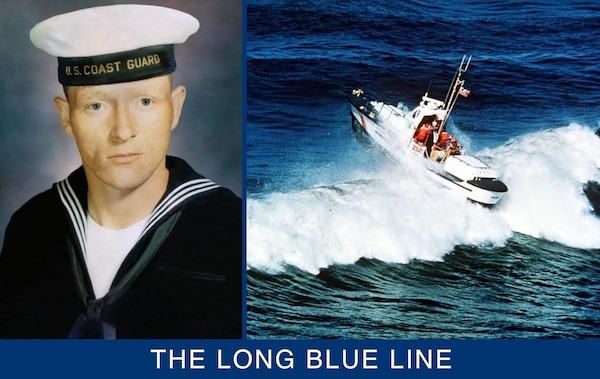Coast Guard hero, FRC namesake Charles Sexton
By Lt. Ryan T. White, U.S. Coast Guard retired, / Published Jan. 19, 2024

Official headshot of Charles William Sexton in dress blues. (U.S. Coast Guard) A 44-foot motor lifeboat powering through heavy breakers common to the West Coast. (U.S. Coast Guard)
The Long Blue Line blog series has been publishing Coast Guard history essays for over 15 years. To access hundreds of these service stories, visit the Coast Guard Historian’s Office’s Long Blue Line online archives, located here: THE LONG BLUE LINE (uscg.mil)
Many of our Coast Guard’s heroes fought in wars abroad or found themselves under enemy fire in foreign countries. However, Charles William Sexton found himself faced with danger in the course of his everyday duties at Coast Guard Station Cape Disappointment. A Coast Guard Machinery Technician First Class, Sexton was rescuing four fishermen in peril when the seas tragically took him.
On Jan. 11, 1991, MK1 Sexton and his crew launched Coast Guard Motor Lifeboat CG-44381 after they received a report that the 75-foot stern trawler Sea King was taking on water four nautical miles northwest of the Columbia River Bar. The Sea King had four men aboard and was sinking with her decks awash and engine room filling with sea water. One of the fishing vessel’s injured crewmembers had been injured after falling to the deck in a failed attempt to evacuate the vessel by helicopter hoist.
MK1 Sexton’s Coast Guard Medal citation reads:
From the relative safety of the motor lifeboat, Petty Officer Sexton unselfishly volunteered to go aboard the foundering fishing vessel to treat the injuries of a Sea King crewmember . . .. He skillfully diagnosed the victim’s injuries, informed the flight surgeon of the extent of the injuries, and provided first aid treatment.
Once the victim was stabilized, Sexton focused his attention on dewatering the vessel. Because Sea King was flooded, it required several dewatering pumps to remove the initial quantity of seawater from the engine room, along with hourly dewatering the vessel, to ensure the boat did not submerge.
After more than six exhaustive hours of dewatering and maintaining the vessel, with the worst of the treacherous bar crossing behind them, the Sea King rolled over without warning and threw its passengers into the agitated seas. The power of the water trapped Sexton in the enclosed pilothouse and he, along with two fishermen, went down with the vessel.
Retired Chief Quartermaster Bill Segelken was on scene as a crewmember aboard Coast Guard Cutter Iris when Sexton was lost to the sea. He was a Quartermaster First Class at the time and remembers vividly the sight of Sea King overturning.
“The Sea King took a long roll to port. While the vessel appeared to be recovering from the roll, the port quarter went under and the ship began to roll,” said Segelken. “While in our minds, as we observed this, it seemed to take forever, the reality is that once the ship started to roll, she was capsized in seconds.”
 |
 |
|
A color image of the Coast Guard Medal and ribbon. (U.S. Coast Guard) |
Grave marker for Coast Guard hero Charles Sexton located at a cemetery in Lakewood, Washington. (Findagrave.com) |
A Special Place in Coast Guard history
There is a certainty of danger that Coast Guardsmen encounter in the line of their everyday duties, whether it is the shifting waters of a river bar or towing an unstable vessel, and it is an unvarying reminder of how fragile life is.
“The Columbia River Bar is always a treacherous place to navigate,” said Segelken. “Even on a nice day the swells could be running at six to eight-feet, and as quick as the current changes directions, they could build to 10 to 12.”
Despite the perilous complexities in the Sea King rescue, Sexton exhibited courage and devotion to duty to save others in the most humbling of ways. Sexton’s courage was recognized as he was posthumously awarded the Coast Guard Medal for extraordinary heroism.
“It has long been understood that the Coast Guard faces danger every day, but that could not be more true than a day on the Columbia River Bar,” said Segelken. “In my career, after this incident, I have spent nearly 15 years in command centers. I have launched countless aircrews and small boats into harm’s way. This case provides me a firsthand reminder of the potential impact of those dangers.”
At the award ceremony on May 17, 1991, Rear Adm. Joseph Vorbach, then commander of Coast Guard District Thirteen, commented on Charles Sexton’s heroic sacrifice: “Keep bright his memory so that next time someone asks who are your heroes, you won’t hesitate to answer Petty Officer Sexton.
 |
|
The Fast Response Cutter Charles W. Sexton underway during a high-speed patrol. (U.S. Coast Guard) |
-USCG-